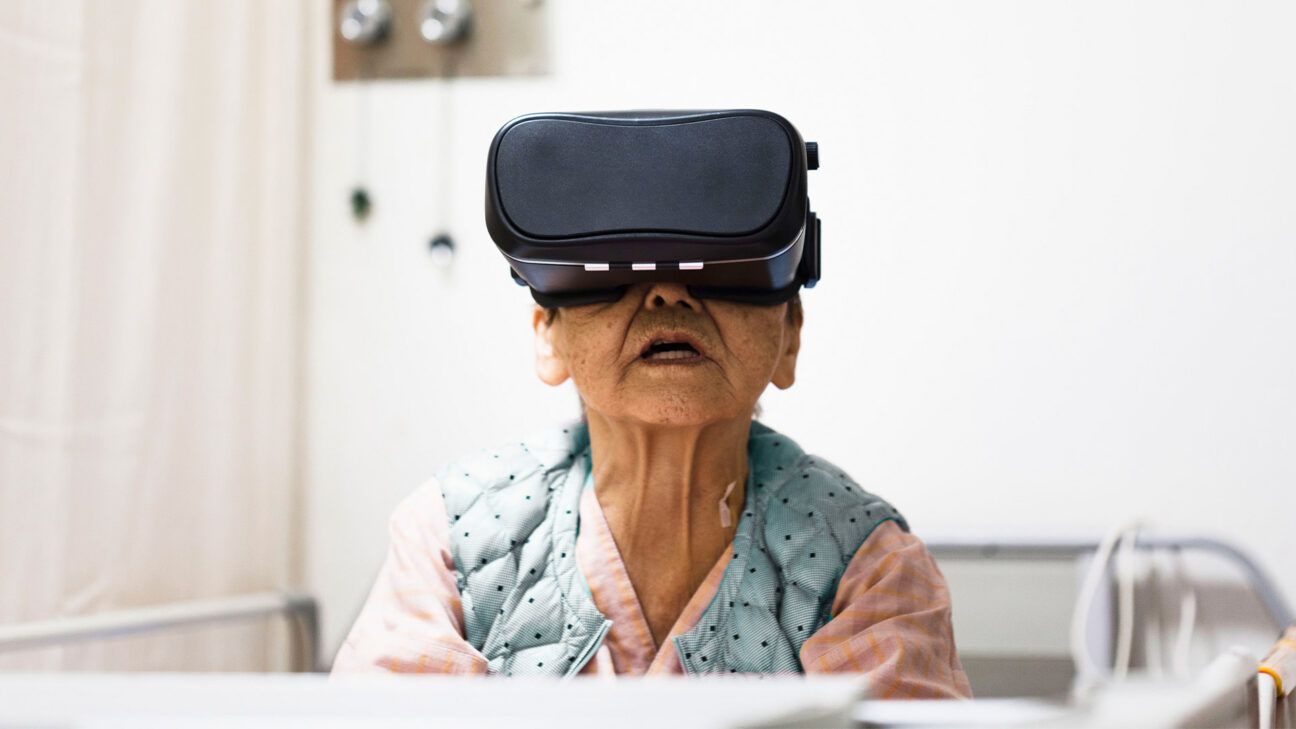
- Virtual reality (VR) is widely believed to have the potential for use in healthcare.
- Despite the growth in VR technology, there is still a dearth of scientific evidence about its effectiveness.
- A new study now concludes that VR technology could be effective for patients with chronic illnesses, but more research is needed.
Could virtual reality become an effective treatment for patients dealing with chronic illness?
As futuristic technologies like immersive VR headsets become more commonplace, so has interest in their potential in healthcare environments. But, so far, most trials involving VR have been limited in terms of their size and data quality.
Now, a more complete picture is starting to form. In an article published this week in the BMJ Supportive and Palliative Care,researchers undertook an expansive review of virtual reality studies to improve psychological well-being in patients with chronic illnesses such as cancer and multiple sclerosis.
The researchers explored numerous research databases, examining everything related to the topic spanning from 1993 to 2023. In total, 31 studies met the inclusion criteria for the review.
After sifting through those studies, the researchers concluded that the future of VR treatments for patients with chronic illness looks promising, but there’s still a long road ahead.
“Our findings suggest that VR interventions are acceptable treatments that have the potential to improve physical and psychological consequences of physical illness…VR interventions are effective in reducing pain and distress, particularly among people with cancer,” wrote the authors in the study.
Dr. Peter Schmidt, a clinical assistant professor of anesthesiology at Stanford University who was not affiliated with the research, told Healthline:
“The authors should be commended for undertaking this comprehensive and challenging review of the use of immersive VR in chronic physical illness. Immersive VR is a promising technology that deserves further study as a minimal-risk intervention to reduce patient distress and increase patient satisfaction.”
The gist of how VR helps patients with chronic illnesses is surprisingly simple: it can serve as an immersive world that is both relaxing and distracting.
Chronic illnesses like cancer and MS are understood to have harmful
Moreover, chronic illnesses often require arduous, time-consuming treatments like dialysis (for kidney failure) or chemotherapy. Virtual reality offers a temporary, relaxing escape from these realities, especially during long stints at the doctor’s office.
Researchers have most commonly deployed VR as an intervention during procedures like these.
So, rather than sitting in your doctor’s office undergoing chemotherapy, you’re exploring the Titanic, walking on a tropical beach, or meandering through a redwood forest. Sometimes, the virtual reality experience might also be paired with specific instructions, such as mindfulness and relaxation techniques.
Although findings varied across the 31 studies reviewed, outcomes from VR interventions included reduced anxiety and stress and improved pain levels.
“Based on our current knowledge, VR would seem best suited for use during medical procedures, specifically during infusions,” said Schmidt.
“No safety issues were reported in any of the reviewed studies, so the potential for benefit outweighs the risks and VR could certainly serve as an adjunct for traditional psychological and pharmacological interventions.”
The fact that VR is a non-pharmacological approach to pain management and mental health is important. F
or patients with chronic pain who might already be taking a cocktail of drugs for treatment and pain management, a treatment that doesn’t add more drugs to the mix is enticing, the study others write.
“Our research is that VR offers a potential alternative to pharmaceutical interventions for managing pain and anxiety related to medical conditions,” lead study author Prof. Martin Dempster of the School of Psychology at Queen’s University Belfast, told Healthline.
“We are not suggesting that VR should completely replace pharmaceuticals but that it could perhaps reduce the need for these drugs, thereby avoiding problems arising from the interactions between different drugs,” he said.
Nonetheless, there are still numerous barriers in place before VR technology can become widespread in healthcare settings.
Both Schmidt and the study authors agree that while the outcomes from VR interventions look promising, studies so far have shown significant variation in their design, outcomes, and even technology. Most studies included in the review were feasibility or pilot studies intended to show proof of concept rather than develop large data sets.
To start with, the technology of virtual reality — both hardware and software — varies widely.
The hardware, that is, the physical systems in place to experience the virtual world, which includes head-mounted goggles, audio devices, and control systems, are made by different companies, including Sony and Facebook, without any standardization in terms of quality and level of immersion.
The next level is the software, the actual virtual reality experience.
The studies reported using many different kinds of VR programs, again with no standard in experience or quality. Although the variance can help paint a general picture of VR interventions, this kind of detail makes existing VR studies hard to reproduce and, therefore, difficult to verify and build upon.
“We need more high quality studies testing the effectiveness of VR in alleviating pain and anxiety so that we can understand how effective they are in relation to other treatment options,” said Dempster.
Schmidt agreed that VR interventions for chronic illness are an avenue worth pursuing but that better studies are needed.
“I would like to see a large, blinded, sham-controlled study on the ability of immersive VR to reduce cancer pain/anxiety over a meaningful time period. This would allow for comparisons with our current standards of care for pharmacological and non-pharmacological interventions,” he said.
An expansive review of medical literature between 1993 and 2023 found that VR treatments could help improve anxiety and pain in individuals with chronic illnesses like cancer or multiple sclerosis.
Studies up to this point have generally been small, offering limited, but promising data.
Experts agree that VR treatments have potential but that more rigorous study is needed.
